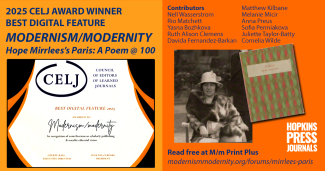Newsroom
Filter
Historian's High-Tech X-Ray of Medieval Book Reveals Mysterious Object
The Spring 2022 issue of Digital Philology: A Journal of Medieval Cultures includes a fascinating paper by J.D. Sargan, Jessica J. Lockhart, Andrew J. Nelson, D.L. Meert-Williston, and Alexandra Gillespie. Dr. Sargan and his team describe the results of a new...

(Re)considering the “Alternatives”
Late in the last century, a long-form essay by Arnold Relman, former editor-in-chief of the New England Journal of Medicine, appeared in The New Republic (December 13, 1998). Titled “A Trip to Stonesville: Andrew Weil, the Boom in Alternative Medicine, and the...

Jennifer Nelson on the abortion debate in Mexico and the United States
The Summer 2022 issue of Journal of Women's History is a special issue on Reproduction, Contraception, and Obstetrics in Modern Mexico. The issue was guest edited by Laura Shelton and Martha Liliana Espinosa Tavares and includes a comprehensive collection of...

Jill Bradbury on experiencing Shakespeare as a Deaf audience member
In the latest issue of Shakespeare Bulletin, Dr. Jill Marie Bradbury relays her experience as a Deaf spectator at several recent Shakespeare productions. How do the choices made by both the production team and the front of house of the theatres themselves...

Reproductive Rights and Healthcare : A Reading List
Last month’s ruling by the U.S. Supreme Court in Dobbs v. Jackson Women's Health Organization walked back longstanding legal precedents that affirm the constitutional right to an abortion. Abortion is now illegal in thirteen states that had what are known as...

Sustaining an Empire
I followed an unconventional path to Venezuelan history while a graduate student at the College of William and Mary, where I benefitted from a small PhD program linked to a rigorous community promoting scholarly innovation at the Omohundro Institute of Early...

What the Birds Taught Me About Environmental Change
The geese were back on the pond this morning, their honks heralding the changing season. I’ve always noted their springtime arrivals and autumn departures, but since writing my book, The Market in Birds: Commercial Hunting, Conservation, and the Origins of...

Revising the Traditional Interpretation of Rural Electrification
Even after decades of retelling, the story of rural electrification in the United States remains dramatic. As textbooks and popular histories inform us, farmers obtained electric service only because a compassionate federal government established the Rural...

Why Rural Electrification has Policy Resonance Today
Rural electrification in the United States (and most industrialized countries) is now a historical fact. But it remains an important goal in several developing countries, where (in 2019) about 13 percent of the world’s population--940 million mostly rural...

When your research surprises you...
The most surprising thing that I learned in writing this book, and the thing I hope readers take away from it, is as simple as it is counterintuitive: early modern scientists really didn’t like the printing press. The technology that proved so transformative...

